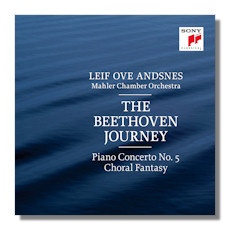
The Internet's Premier Classical Music Source
Related Links
- Beethoven Reviews
- Latest Reviews
- More Reviews
-
By Composer
-
Collections
DVD & Blu-ray
Books
Concert Reviews
Articles/Interviews
Software
Audio
Search Amazon
Recommended Links
Site News
 CD Review
CD Review
Ludwig van Beethoven

The Beethoven Journey
- Piano Concerto #5 in E Flat Major, Op. 73
- Choral Fantasy in C minor, Op. 80 *
* Prague Philharmonic Choir
Mahler Chamber Orchestra/Leif Ove Andsnes
Sony Classical 8843-05886-2 56 min
I had nothing but praise for Andsnes in the first two volumes of his Beethoven Journey series. They contained Piano Concertos 1 & 3 (Sony 42058) and 2 & 4 (Sony 70548). This final volume is just as successful, capping off what must now be counted among the finest cycles of Beethoven piano concertos ever recorded. Of course, the set offers the Choral Fantasy as well, and I'll get to that in a moment.
Andsnes delivers a very spirited and joyful account of the first movement of the Emperor. It is a bit lighter in certain respects than is customary: strings are somewhat less assertive and Andsnes often eschews bigger keyboard sonorities. As usual Andsnes is masterful in his phrasing and subtle in his use of dynamics. Oddly, the lower strings, especially when playing rhythms, are more noticeable in the sound field, and winds typically are a bit more prominent too. Still, the balances Andsnes obtains from the Mahler Chamber Orchestra are in proper proportion and you can hear Beethoven's orchestration in fine detail. The tempos he chooses are pretty much consensus, like most other pianists in this movement, which raises an interesting and astonishingly peculiar issue.
Over the years I've noticed that almost every pianist I've encountered on record employs virtually the identical tempos in this lengthy opening panel. Out of seventeen recordings of the work in my collection, sixteen of the pianists take the first movement in the range of 20:04 to 20:55! Only Daniel Barenboim in his 2007 cycle on EuroArts breaks the pattern, but just barely, clocking in at 21:09! Andsnes, by the way, takes 20:06. In a movement of such length, you would expect a range of at least 18 to 22 minutes. (I've encountered no other concerto or symphony movement like this.) So, is this a grand coincidence or does this music speak so directly to the performer that it demands metronomical constancy? What other explanations could there be?
At any rate, Andsnes embraces the consensus timing, but still makes some minute and well-judged tempo adjustments, and his performance comes across as flexible and supple, not rigid. His second movement is quite lovely too and his finale brims with energy and sunlight. Again, his phrasing and dynamics are subtle and imaginative, and the orchestra plays splendidly. This is quite simply one of the finest versions of this work on record. Brendel (three times), Perahia, Buchbinder, Uchida, Cliburn and others have offered excellent accounts, but Andsnes' rendition is at least as compelling as theirs and maybe even better.
The Choral Fantasy is not top-drawer Beethoven, though I'll concede there are more than a few champions of the work. It opens with a lengthy piano introduction, a sort of cadenza that goes nowhere. Soon the composer presents a theme that sounds like a weak cousin of the famous theme in the finale of the Ninth Symphony. There follow several variations and then the chorus finally enters. It is here that the Choral Fantasy has its best moments. Andsnes dispatches the work in about eighteen and a half minutes, a fairly brisk duration which I think strengthens the piece. His performance sounds flawless, making about the best case possible for the music. The Prague Chamber Choir sings heavenly tones and the orchestra plays with gusto and accuracy.
Sony Classical's sound is vivid and quite powerful in both works and the album notes by Jürgen Otten are quite informative. The Beethoven Journey thus ends with another splendid effort by Leif Ove Andsnes. Highly recommended.
Copyright © 2014, Robert Cummings




















